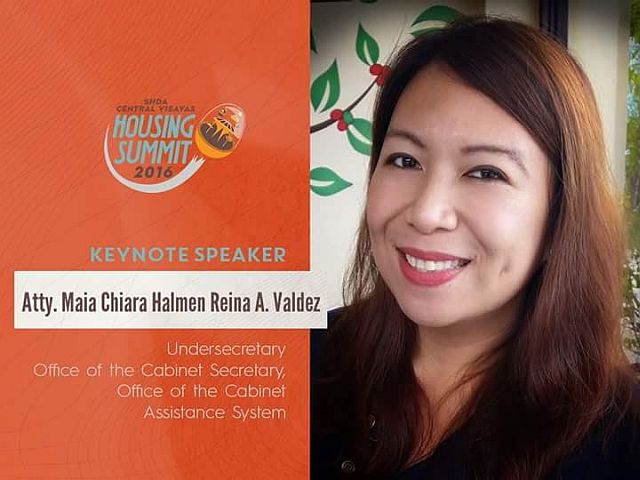How housing backlog should be addressed

VALDEZ
The private housing development sector is encouraged to strengthen ties with the government so that they can work together to continue to address the housing backlog, which in effect can help address the problem of poverty in the country.
Undersecretary Maia Valdez of the Office of the Cabinet Secretary said there is a need to continue producing low-cost and socialized housing to address the country’s housing backlog, a problem which her office deems as one caused by poverty along with problems in education and food security.
Latest data from the Housing and Urban Development Coordinating Council (HUDCC) showed that the country will face a housing backlog of 5.5 million by end-2016, an estimated 1.9 million of which is in the Visayas.
“The government will not be able to fix this alone as our housing problem is one that is broad and complex. It requires a holistic government approach and not merely a provision of four walls and a roof,” said Valdez during the Subdivision Housing Developers Association (SHDA) Central Visayas Housing Summit in Cebu City last week.
She said it is necessary to have a wider perspective in addressing the needs of residents, from financial stability to the full development of human potential and climate resiliency.
Partnership
She also emphasized that the need for a stronger partnership between the government and private sector developers .
“We hope to deepen our partnership through improving our build-up areas with quality, climate-friendly, affordable, and sustainable communities as well as ensuring balanced housing that will cater to informal sector families,” Valdez said during the biggest gathering of all top housing developers in the region at the Radisson Blu Hotel.
Valdez encouraged developers to help relocate informal settlers while government would ensure that they would guide each stakeholder in adopting the new urban development and housing framework, balanced housing development program and other related public sector initiatives.
On the holistic approach on the housing problem, Valdez also said that the Office of the Cabinet Secretary is also considering starting possible programs that will help address this problem such as opening the Islamic housing finance market, forming cooperatives in relocation sites and creating indigenous agri-ecotourism communities.
Review policies
Her office has also engaged in the review of policies related to housing such as the proposed moratorium on the processing and approval of all applications for land conversion by the Department of Agrarian Reform (DAR).
Valdez said her office throws its support behind the housing community, as the moratorium is “quite detrimental to the deficiency [they] are trying to address involving the housing backlog.”
The Presidential Agrarian Reform Council in September started working on an executive order placing a two-year moratorium “on the processing and approval of all applications for all land-use conversion of agricultural lands for non-agricultural uses.”
DAR Secretary Rafael Mariano, in earlier reports, said that it was necessary to put in a place a policy preserving agricultural lands to ensure food security.
Balance
Valdez said that while her office supports the housing sector, they will maintain its stand to balance the housing industry with matters of food security.
Now on its second year, the SHDA housing summit is a collection of the region’s best real estate developers, stakeholders, investors and housing-related government units, tackling a wide range of housing concerns and is a venue for customer-developer interactions.
Disclaimer: The comments uploaded on this site do not necessarily represent or reflect the views of management and owner of Cebudailynews. We reserve the right to exclude comments that we deem to be inconsistent with our editorial standards.
